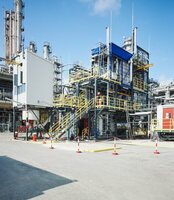- OMV will invest EUR 30 mn in the pilot plant, with EUR 6.9 mn from the Austrian Research Promotion Agency.
- Construction starts in Q2 2021, with operations beginning in 2023.
- The plant will produce 1.25 mn liters of propanol annually, reducing CO2 by 1,800 metric tons.
- Long-term goal: 125 mn liters of propanol per year, cutting CO2 by 180,000 metric tons.

Investment and Funding
OMV plans to invest EUR 30 million in a pilot plant at its Schwechat Refinery, with EUR 6.9 million funded by the Austrian Research Promotion Agency (FFG) and additional support from the COVID-19 premium. Construction is scheduled to begin in the second quarter of 2021, with the plant becoming operational in 2023.
Production Process
The plant will use a patented process developed by OMV to convert glycerin, a waste byproduct from biodiesel production and soap manufacturing, into propanol. This process involves a catalyst developed in-house and operates under moderate temperature and pressure, producing 1.25 million liters of propanol annually. The conversion rate is 1.2 liters of crude glycerin to 1 liter of propanol.
Environmental Impact
The production of propanol at the pilot plant is expected to reduce CO2 emissions by approximately 1,800 metric tons per year. The long-term goal is to scale up production to 125 million liters of propanol annually, which would result in a CO2 reduction of around 180,000 metric tons.
Future Plans
OMV aims to commercialize the technology developed at the pilot plant, integrating it into the existing value chain at the Schwechat Refinery. The propanol produced will serve as a bio-additive for gasoline and as a sustainable feedstock for the chemicals market, replacing fossil-based propanol.

